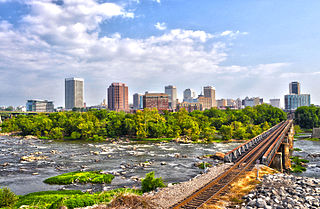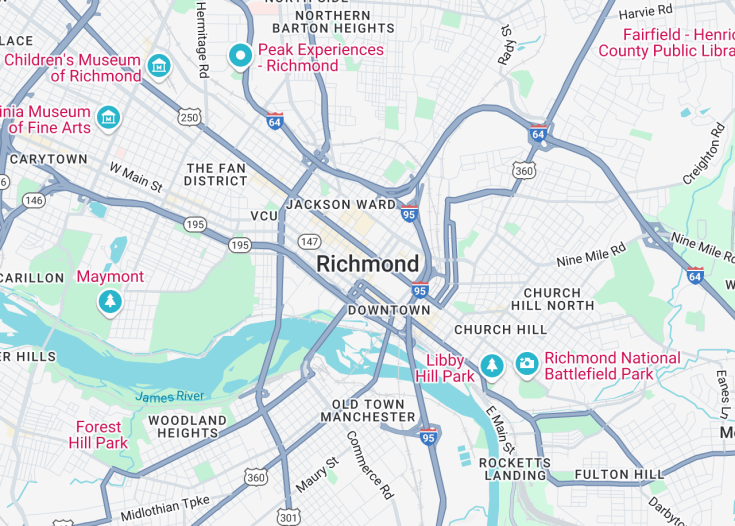Richmond, the capital city of Virginia, beckons with its rich tapestry of American history and vibrant cultural scene. This picturesque city, nestled on the banks of the James River, features a blend of historic landmarks, extensive museums, and bustling arts. Walk through time in its historic districts or explore contemporary art displays and culinary delights. Richmond also serves as a gateway to Virginia’s scenic landscapes, offering natural attractions alongside urban convenience, making it a compelling destination for every traveler.
To maximize your experience in Richmond, plan a visit during the fall to witness the stunning foliage and enjoy the comfortable climate.
Consider taking a guided tour of the city’s historical sites to gain a deeper understanding of Richmond’s pivotal role in American history.
Top things to do & see in Richmond Virginia
Select the following sights and activities to discover best tickets and tours available in Richmond Virginia.
Richmond Virginia: A Storied Capital with Southern Charm
| Country | Virginia (USA) |
| Time in Richmond Virginia | GMT-5 |
| Language spoken | English |
| Population | 230,436 (U.S. Census Data, 2020) |
| Currency | United States Dollar (USD $) |
| Airports |
|
Richmond, Virginia, is not only the capital of the state but a repository of American history and culture. With origins stretching back to colonial times, it was a pivotal city during the American Civil War and serves today as a hub for arts, education, and government. Its location on the James River adds a scenic charm and provides ample opportunities for outdoor activities and waterfront events.
Where is Richmond Virginia?
Located at the fall line of the James River in Virginia, USA, Richmond serves as the cultural and economic center of the region.
Distances:
| Route | Distance by car | Time by car |
|---|---|---|
| Washington D.C. to Richmond VA | 109 miles | about 2 hours |
| Virginia Beach to Richmond VA | 107 miles | about 1 hour 40 minutes |
| Charlottesville to Richmond VA | 71 miles | about 1 hour 15 minutes |
What is Richmond Virginia famous for?
Richmond is renowned for its rich Civil War history, hosting several key sites and battlefields, including the American Civil War Museum, and its vibrant arts scene featured prominently in the Broad Street Commercial District.
History
1607-1775: Early Settlement and Colonial Period
The history of Richmond, Virginia, began around 1607 when English settlers explored present-day Richmond along the James River. The region was originally inhabited by indigenous groups such as the Powhatan Confederacy. Richmond’s strategic location at the fall line of the James River made it a favorable place for settlement. In 1737, William Byrd II commissioned the layout of Richmond, and the town was officially established in 1742. During the colonial period, Richmond began to grow as a center for trade and commerce within the Virginia colony.
1775-1865: Revolution and Civil War
Richmond played a significant role during the Revolutionary War as a hub of resistance against British rule. In the ensuing decades, it evolved into a major industrial base. The city was named the capital of Virginia in 1780, transferring the title from Williamsburg. Richmond’s prominence continued into the Civil War when it was designated the capital of the Confederacy in 1861. The city faced numerous battles and was eventually captured by Union forces in 1865, signaling a pivotal moment in the war.
1865-20th Century: Reconstruction and Growth
Post-Civil War, Richmond underwent Reconstruction, facing challenges like rebuilding its economy and integrating freed African Americans. The late 19th and early 20th centuries marked a period of significant growth and modernization, with the development of the tobacco industry and railroads. This era also saw the rise of Jim Crow laws and segregation policies which impacted the social structure of the city.
20th Century-Present: Modernization and Revitalization
Throughout the 20th century, Richmond transformed with advancements in education, finance, and law. Virginia Commonwealth University and the University of Richmond contributed to the city’s educational and cultural expansion. In recent decades, Richmond has focused on revitalization efforts, particularly in the downtown area, promoting arts, culture, and tourism. The city today is known for its rich history, diverse cultural landscape, and vibrant community activities, making it a unique blend of historical significance and modernity.
Visit Richmond, Virginia
What to see and do in Richmond, Virginia (USA).
Richmond, Virginia, brims with activities and attractions that cater to history buffs, art lovers, and outdoor enthusiasts alike. Key highlights include:
- The Virginia State Capitol, designed by Thomas Jefferson, offers tours showcasing historical American architecture.
- Richmond National Battlefield Park, where visitors can explore key Civil War battle sites.
- The Virginia Museum of Fine Arts, which houses a diverse collection of art from around the world.
- Carytown, a unique shopping district with boutiques, eateries, and the historic Byrd Theatre.
- The James River, offering ample opportunities for kayaking, paddle boarding, and scenic walks along the riverside trails.
These activities provide a comprehensive glimpse into the rich cultural tapestry of Richmond.
Festivals and Events in Richmond
Richmond is vibrant with events throughout the year:
- The Richmond Folk Festival in October, celebrating music, dance, and traditional arts from diverse cultures.
- Broad Appetit in June, where food lovers can enjoy dishes from the city’s best restaurants.
- The Richmond International Film Festival, an annual event that showcases local and international films.
- First Fridays, a monthly art walk featuring galleries, shops, and live music in the Arts District.
These events highlight Richmond’s lively and inclusive community spirit.
Best time to visit Richmond
The ideal time to visit Richmond is during spring (April to June) and fall (September to November). These months offer pleasant weather, vibrant foliage, and a full calendar of events, making them perfect for exploring the city’s outdoor and cultural activities.
Is Richmond worth visiting?
Richmond is certainly worth visiting for its rich tapestry of history, culture, and natural beauty. The city offers a unique blend of historical sites from the Civil War era alongside vibrant cultural institutions like museums and art galleries. Outdoor enthusiasts will enjoy the scenic James River and numerous parks. The diverse culinary scene and lively events calendar further enhance the travel experience, ensuring that there is something for everyone. Whether interested in history, the arts, or outdoor activities, Richmond provides an enriching and engaging visit.










